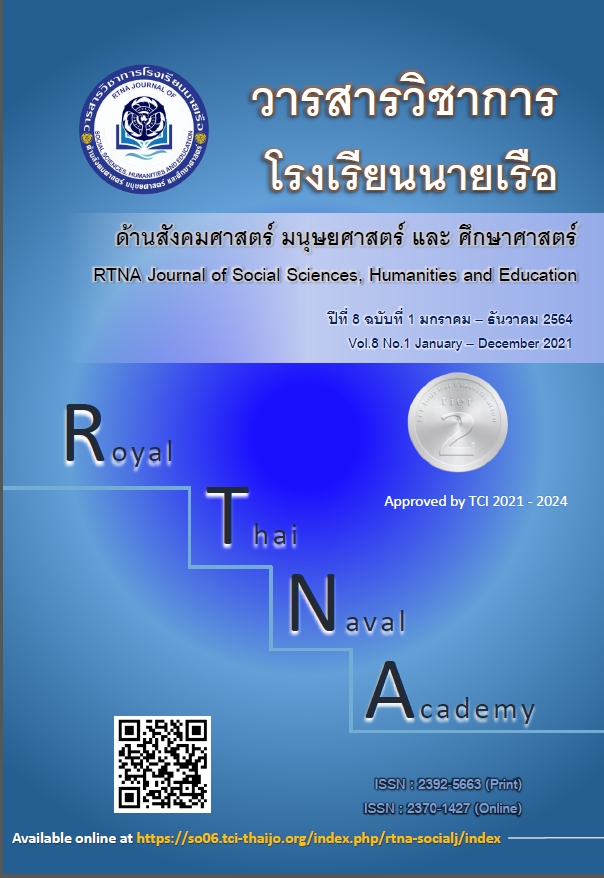The Development of Professional Learning Community to Research (PLC to R) The Models for Teacher in Basic Education School in the Thai Eastern Region
Keywords:
Professional Learning Community, PLC to Research, Basic EducationAbstract
This research aims to study teachers’ research efficacy which are about knowledge and understanding the teacher self-improvement process regarding the Professional Learning Community (PLC) process. Additionally, the research is also to develop and evaluate a model for implementation of professional learning communities to research hereafter PCL to Research. 478 peoples stratified random sampling are target group. 17 experts are professors from the Faculty of Education, administrators, and teachers with experience in research and PLC. All of them have doctoral degrees. 42 teachers were the experimental targets. The result are consensus analysis by Mdn, IQR, Descriptive Statistic using Mean, SD, Frequency, and Percentage. Inferential Statistic using t-test, One-way ANOVA, Pair comparison by Scheffe's Method, correlation analysis by Pearson's correlation coefficient (rxy). The summaries of research are as follows: Pre participation, the teachers’ research efficacy indicate that the overall efficacy is at the moderate level (M=3.28, SD=0.62) whereas post participation, the overall research ability is at the higher level (M= 4.60, SD=0.49). 77.34 percent of the overall relative development index for each teachers’ knowledge and understanding of PCL operation indicates that teachers are at the high level of knowledge and understanding of PLC operation (M=4.05, SD =0.86). Applied Delphi Techniques are tools for developing a PLC model to be research. A model of conducting professional learning community as research (PLC to Research) of teachers is a traditional process. Activities and research mechanisms and PLC processes are 30 items. Evaluation from 17 Experts, based on accuracy, appropriate from the median (Mdn), and the inter-quartile range (IQR), shows the highest rating in all items which are correlated all together. Based on mean and standard deviation of the feasibility, utility of activities and mechanisms of the PLC to R model of 30 items, the evaluation from 42 teachers, the target group, is clear to show the feasibility evaluation and the benefits of the activities and mechanisms of the PLC to R model overall are at the high level (M=4.22, SD=0.23). 7 items of the PLC to R model are at the highest level whereas 23 items are at high level. The results confirm the benefits of the PLC to R model.
References
กฤษมันต์ วัฒนาณรงค์. (2553). การเป็นอาจารย์ที่ปรึกษาโครงการและวิทยานิพนธ์. กรุงเทพฯ: มหาวิทยาลัยเทคโนโลยีพระจอมเกล้าพระนครเหนือ. สืบค้นจาก http://Thairath.co.th/content/135382
จุมพล พูลภัทรชีวิน. (2544). เทคนิคการวิจัยอนาคตแบบ EDFR. ใน ทศพร ศิริสัมพันธ์ (บรรณาธิการ). เทคนิควิธีการวิเคราะห์ นโยบาย. (พิมพ์ครั้งที่ 5). กรุงเทพฯ: จุฬาลงกรณ์มหาวิทยาลัย.
ชัยลิขิต สร้อยเพชรเกษม. (2555). การวิจัยด้วยวิธีเดลฟาย:การใช้มติสอดคล้องโดยเสียงข้างมาก. วารสารวิชาการบัณฑิตศึกษามหาวิทยาลัยราชภัฎนครสวรรค์, 7(18), 1-13.
ณรงค์ฤทธิ์ อินทนาม. (2553). การพัฒนาหลักเทียบสำหรับการสร้างชุมชนการเรียนรู้ทางวิชาชีพในโรงเรียน. (วิทยานิพนธ์ครุศาสตรดุษฎีบัณฑิต, จุฬาลงกรณ์มหาวิทยาลัย).
พงศ์เทพ จิระโร. (2562). หลักการวิจัยทางการศึกษา. ชลบุรี: ภาควิชาวิจัยและจิตวิทยาประยุกต์คณะศึกษาศาสตร์ มหาวิทยาลัยบูรพา.
พงศ์เทพ จิระโร และอาพันธ์ชนิด เจนจิตร. (2563). การวิจัยกำกับ ติดตาม และประเมินผล การจัดกิจกรรมพัฒนาวิชาชีพแบบชุมชนแห่งการเรียนรู้ทางวิชาชีพ (PLC) ของเครือข่ายที่รับเงินทุนอุดหนุนกิจกรรมพัฒนาวิชาชีพของคุรุสภา ประจำปี2562: ภูมิภาคตะวันออก. วารสารศึกษาศาสตร์ มหาวิทยาลัยบูรพา, 31(3), 12-26.
พิชัย ตุ้งประโคน. (2556). บนทางเดินชีวิต: ครูผู้ช่วย. สืบค้นจาก https://www.gotoknow.org/posts/197670
วิจารณ์ พานิช. (2551). R2R: ROUTINE TO RESEARCH สยบงานจำเจด้วยการวิจัยสู่โลกใหม่ของงานประจำ. นนทบุรี: สถาบันวิจัยระบบสาธารณสุข (สวรส.) กรมสุขภาพจิต กระทรวงสาธารณสุข.
วิจิตร ศรีสอ้าน. (2554). ประสบการณ์ในการใช้ประโยชน์และความก้าวหน้าทางอาชีพของนักวิจัยสถาบัน. เอกสารประกอบการบรรยายวิจัยสถาบัน. วันพุธที่ 9 มีนาคม 2554 ณ ห้องสารนิเทศ อาคารบริหาร มหาวิทยาลัยเทคโนโลยีสุรนารี.
ศิริชัย กาญจนวาสี. (2538). การวัดการเปลี่ยนแปลง. ใน การประชุมเชิงปฏิบัติการครั้งที่ 3 เรื่อง “หลักและวิธีวิจัยขั้นสูงเฉพาะการวิจัยและพัฒนาระบบพฤติกรรมไทยด้านต่าง ๆ” สำนักงานคณะกรรมการวิจัยแห่งชาติร่วมกับคณะกรรมการแห่งชาติเพื่อการวิจัยและพัฒนาระบบพฤติกรรมไทย. กรุงเทพฯ: สำนักพิมพ์แห่งจุฬาลงกรณ์มหาวิทยาลัย.
สมถวิล วิจิตรวรรณา. (2556). แนวคิดเกี่ยวกับการวิจัยเชิงประเมิน. นนทบุรี: สำนักทะเบียนและวัดผล มหาวิทยาลัยสุโขทัยธรรมาธิราช.
สมหวัง พิธิยานุวัฒน์. (2541). วิธีวิทยาการทางการประเมิน. กรุงเทพฯ: จุฬาลงกรณ์มหาวิทยาลัย.
สำนักงานคณะกรรมการข้าราชการครูและบุคลากรทางการศึกษา. (2561). คู่มือการประเมินให้ข้ราชการครูและบุคลากรทางการศึกษาตำแหน่งครูมีวิทยฐานะและเลื่อนวิทยฐานะ. กรุงเทพฯ: สำนักงานคณะกรรมการ การศึกษาขั้นพื้นฐาน สำนักงานปลัดกระทรวงศึกษาธิการ กระทรวงศึกษาธิการ.
สุวิมล ว่องวาณิช. (2553). การวิจัยปฏิบัติการในชั้นเรียน. (พิมพ์ครั้งที่ 13). กรุงเทพฯ: สำนักพิมพ์แห่งจุฬาลงกรณ์มหาวิทยาลัย.
Charles, C.H. (2010). The effect of professional learning community principles on English language learner instructional practices and reading achievement. (Doctor of Philosophy In Educational Leadership and Policy Studies). Virginia Polytechnic Institute and State University. Blacksburg, VA.
DuFour, R., & Eaker, R. (1998). Professional Learning communities at work: Best practices for enhancing student achievement. Bloomington, IN: Solution. Education Service.
DuFour, R., Eaker, R., & Many, T. (2006). Learning by Doing A Handbook for Professional Learning Communities at Work. Bloomington, IN: Solution Tree Press.
Macmillan,T.T. 1971. The Delphi Technique. Paper Presented at the annual meeting of the California Junior Colleges Associations Committee on Research and Development. Monterey: California. (May 1971): 3-5.
Stufflebeam, D. L. (1981). Meta-evaluation: Concepts, standards, and uses. In R. Berk (Ed.), Educational evaluation methodology: The state of the art. Baltimore, MD: Johns Hopkins.
Downloads
Published
Issue
Section
License
The author has the sole responsibility for the material published in RTNA Journal of Social Sciences, Humanities, and Education, which the editorial team may not agree on that material.
RTNA Journal of Social Sciences, Humanities, and Education owns the copyright of the text, the illustration, or other material published in the journal. No parts or the whole of the material published may be disseminated or used in any form without first obtaining written permission from the academy.






